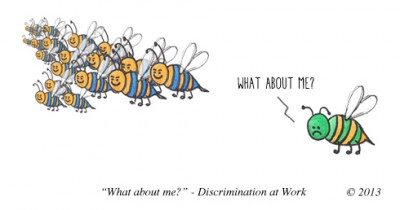Racial Discrimination includes colour; nationality and ethnic or national origins. It is widely anticipated that discrimination on the basis of caste will also join this category in the future.
Claims for racial discrimination are notoriously difficult to win at tribunal. Many cases settle before they reach the point of tribunal because employers are, understandably, unwilling to accept the negative publicity surrounding discrimination claims. An employee bringing a claim of racial discrimination to a tribunal is five times more likely to be unsuccessful than to win their case. (Source: ET and EAT statistics 2011/12)
Some of the difficulty in presenting a claim lies in the difficulty in providing evidence (proof) of alleged discrimination. Whilst it is rarely possible to find written evidence of discrimination a tribunal can infer discrimination from the facts of the case. That might mean that a tribunal will accept that discrimination has occurred where, for example, white workers are promoted more frequently than workers from a particular ethnic group.
Different Types of Racial Discrimination
There are four forms of discrimination under the Equality Act 2010.
Direct Discrimination
This describes the situation in which someone is treated less favourably because of their actual or perceived race or the race of someone with whom they associate.
Example: Miss P applies for a job as a nursery teacher, she is turned down for the role and in the phone call from the Nursery Manager she is told that although the manager does not have a problem with Miss P originally being from Poland she thinks that some of the parents at the nursery may have a problem and she cannot risk them withdrawing their children in the current economic climate. This is a clear case of racial discrimination; Miss P is being denied the role on account of her national origin.
Indirect Racial Discrimination
Contrastingly, indirect racial discrimination does not consider whether people from different national, racial or ethnic backgrounds have been treated differently but considers the cases where a ‘provision, criterion or practice’, although applied equally, has the effect of disadvantaging employees from one particular group.
Example: A company creates a new role within its organisation for a conference presenter. Amongst the criteria it publishes on its intranet it states, ” the requirement for a high level of presentation skills means that this role is only suitable for a person with an A level in English”. The requirement for an A-level in English indirectly discriminates against employees from other nations who have undertaken different qualifications.
Unlike direct discrimination there is a defence to indirect discrimination of objective justification. In the case of racial discrimination this is extremely unusual and might be limited to occupational requirements such as an actor with a dark complexion being required to take a particular role in a play.
Harassment
Harassment is the term used to describe unwanted conduct in the workplace. It might include any sort of bullying, abusive or offensive language and images. It is irrelevant whether it is a business owner or a colleague who has subjected an employee to harassment because employers are vicariously liable (responsible) for the actions of their employees. It is also possible for an employee to bring a claim for harassment even though they do not hold the particular characteristic. In other words, an employee need not be from Pakistan in order to find abusive comments about people from Pakistan offensive for the purposes of a claim.
Victimisation
In order to protect those people who make complaints to their employers, or issue or assist in cases at tribunals, the Equality Act prevents employers from victimising employees who have done so. If an employee is subjected to a detriment (unfavourable treatment such as dismissal or denial of promotion) as a result of a claim made under the act then they have the right to make a claim to a tribunal.

